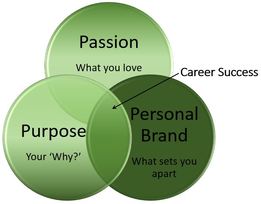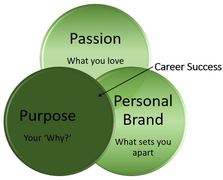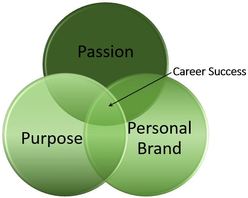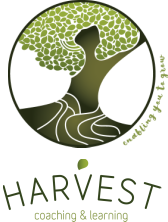 The Story So Far… In Discovering The 3Ps to Launch, Grow or Reinvent Your Career – Part 1, we talked about your passion and purpose as being ‘what’s right with you’ and we outlined some tips on how to tap into your passions. In Part 2 we looked at your purpose as your ‘why’, how to explore this and why it’s significant. In Part 3 we bring this together and look at how to express your passions and your purpose through your Personal Brand, as well as why this is important. Personal Brand – What it’s not! At this stage you may have an idea of what your passions are and how they underpin your purpose, along with some ideas around your strengths, values, skills, experience and talents. If not, give me a call (0413 776 564) and I can help you with this. Before we talk about personal branding, let me share with you that the first time I heard about the concept of a personal brand I actually found it a bit ‘icky’. That’s the technical term! The reason I found it ‘icky’ is that I didn’t really understand it properly. I felt that I needed to decide what I wanted to be and then create a package of myself to represent that. I now know I had it the wrong way around. Personal branding isn’t about being something you’re not. After all, that’s very difficult to sustain and the truth is that people see straight through it. What is Personal Branding? So what is personal branding? Really, it’s about understanding who you are, what your strengths are and how you are unique, and then presenting this to the world, and in particular to the workplace in a genuine, authentic and consistent way. Consistency is important here because consistency is a component of trust and you want people to trust your brand. Another way to think about your personal brand is as your reputation. It’s your calling card. It’s what you’re known for and how people experience you. Jeff Bezos, Founder of Amazon.com says personal brand is what people say about you when you leave the room. And thinking about your personal brand has become increasingly important with the surge of social media, as you need to think about how you are portraying yourself both in real life and online. This is where it’s really important to know what’s right with you, as we touched on in Part 1. Considerations In thinking about your personal brand, consider:
In all of this, you will start to develop a package of your values, goals, and experience in a way that shows what unique solutions you can offer an employer, be it your current employer or a future employer. It can take a bit of time to work through your personal brand, but it’s well worth the effort to understand this and how it impacts the way people experience you. Does your Personal Brand represent you accurately and as you would like it to? Summing Up In summing up all three parts of this blog:
If you would like some support to explore your passions and purpose and to understand how this will form your personal brand, give me a call (0413 776 564) and we can do this together. Have a wonderful day. Warmest wishes, Laurenne Di Salvo Leadership & Professional Development Coach | Corporate Trainer | Learning & Development Consultant 0413 776 564 www.harvestcoaching.com.au
1 Comment
 In The 3Ps to Launch, Grow or Reinvent Your Career – Part 1, we talked about your passion and purpose as being ‘what’s right with you’. We also outlined some tips on how to tap into your passions. In Part 2 we look at your Purpose. Purpose – Your ‘Why?’ Working out your purpose is no small question, yet this is probably more important than your passions. This is because, while your passions can be transient, your purpose tends to be more stable. Your purpose can be described as your ‘why?’ and this is what will allow you to thrive not only at work, but at life. Your life purpose doesn’t have to be your career or your job, but if you can align the two, all the better. “He who has a why can endure any how.” German philosopher Frederick Nietzsche once said, ‘He who has a why can endure any how.’ Knowing your why is an important first step in figuring out how to achieve the goals that excite you and that help you create a career and a life you enjoy. Focusing on your purpose can also help to keep you going during challenging times. Purpose and Meaning in Life Are Fundamental Human Needs In positive psychology terms, achieving a meaningful life contributes to an increased sense of wellbeing. And that’s because finding purpose or meaning in life and contributing are fundamental human needs. Great! So how on earth do you work this out! And, does this actually have to come from your work? And how is it different from your passions? Where Do You Invest? One way to understand your purpose is to think about where you feel driven to invest your time, your focus and your personal energy. Going Back to Move Forward For me, going back to move forward was helpful in working through my purpose. Thinking back to when I was a teenager, I was always drawn to the helping professions. I got off track for a bit because back then the helping professions were all in the therapeutic or medical space. I’ve since realised that my purpose is more around helping people thrive through the developmental spaces (coaching and training), rather than the therapeutic spaces. When I think about my why, it’s the satisfaction I get from supporting people to thrive. When I found myself in roles that didn’t allow me to do this, I wasn’t really happy and needed to find ways to ensure I could come back to this. Some examples of purpose might include a few of the following: for healers, their purpose may be about improving and sustaining well-being; for artists, it may about creating something meaningful or beautiful; entrepreneurs and inventors might want to bring new and useful things into the world; for justice-seekers, it’s often about righting wrongs, defending the defenseless and making the world a better place. Purpose and Values As you can imagine, all our ‘whys’ are underpinned by different values, and tapping into your values is an important part of working out your purpose. Importantly too, it’s about then making sure your values are aligned with your actions, with the work you do, and ideally, with the values of the company you work for or you would like to work for. There are many ways to explore your values. One way I heard about that won’t give you a definitive answer, but which acts as a bit of a thought starter, is to ask yourself three questions:
Again, this isn’t going to give you a definitive list, but it’s a thought starter. If you are interested in delving into your purpose and into your values in greater depth, give me a call (0413 776 564) and we can work this through together. Once you have a good understanding of your passions and purpose, you will want to express this through your Personal Brand. We’ll discuss this in Part 3. Have a wonderful day. Warmest wishes, Laurenne Di Salvo Leadership & Professional Development Coach | Corporate Trainer | Learning & Development Consultant 0413 776 564 www.harvestcoaching.com.au  I wonder if have any questions that play on your mind around your career journey? Questions like:
I think there are two things necessary to answer your questions:
Change So change - the thing about change is that can be scary and exiting, and overwhelming and wonderful. Regardless of how we get to the point of change, the key thing about change is that it’s constant. I think it’s generally accepted these days that we’re likely to have at least 3 career changes in our lives. That’s certainly been true for me and I expect that I still have a long career ahead of me. Why is it that people change careers multiple times? After all, it takes courage and self-awareness and pushes us out of our comfort zones. No doubt there are many reasons. One reason is that people generally don’t want to work just for money. Of course money is important, but it’s really a hygiene factor. That is, we need it, but it’s not what keeps us motivated long term. Rather, we’re looking for enjoyment, satisfaction and meaning. After all, we spend a lot of time at work! Sometimes changes to our work lives are voluntary and sometimes we’re pushed (e.g. redundancy). Whatever your catalyst, one of the keys to effectively navigating change is to be proactive, and this requires you to make choices. To make good choices you need to understand what’s important to you. This is where tapping into the 3Ps can help, guiding you towards your personal version of success. The 3Ps The 3Ps are your Passion, Purpose and Personal Brand. These are critical factors in guiding your career journey, and I do say journey as career really is a journey, not a destination. It’s not that anyone gets to a particular role and then doesn’t want to develop further. After all, growth and learning is part of the adventure. Career is about continually navigating your personal journey. In this blog, we’ll touch on purpose, but the key focus is the role of passion in your career journey. We’ll look at purpose and personal brand in upcoming blogs. Passion Part of looking at both passion and purpose is about looking at what’s right with you, what lights you us, what provides meaning in your life. Traditionally we’ve been told to look at what’s wrong with us and to develop these areas. Yet it’s what’s right with us that’s going to guide our journey, and what’s right with us is our strengths, our values and our skills, and this all underpins our passions and purpose and allows us to be authentically us – which is our personal brand. This idea has strong foundations in positive psychology. It’s a wonderful framework to underpin your career journey because it’s based on growth and development and about finding out what engages you and what’s meaningful to you, allowing you to live a happy and fulfilling life. Strengths and Weaknesses as a Sailboat I read a metaphor in the positive psychology literature that really resonated for me. It likened the use of our strengths and weaknesses to a sailboat. Let me explain. If you think of your weaknesses as the holes in the boat, you obviously need to plug them. You can’t ignore your weaknesses or the boat will sink. However, no matter how well you plug them, it won’t impact the direction the boat sails, or how fast it moves. If you focus on your strengths, which are often linked to your passions, these are the sails. The more wind you put in your sails, the more passion you put into your sails, the faster you can go and the easier it is to guide the direction you want to move. Part of what we want to do is to work out how to put wind in our sails. What is Passion? Let’s explore passion. Passion’s a word that gets thrown around a bit these days, a bit like ‘awesome’. But what is it really? Passion is your drive, your motivation, your zeal. I like to think of it as energy – when you feel passionate about something, you both bring a lot of energy to it and you also get a lot of energy from it. Flow Whichever way you understand it and whatever passion looks like for you, if you can tap into your passions and apply them in a work context, you tend to find yourself in ‘flow’ a lot more often and this is a state that’s been linked to greater happiness and wellbeing. In positive psychology terms, it allows you to reach what Martin Seligman calls the ‘Engaged Life’. This state of flow is where you are totally absorbed in what you’re doing to the point that you lose all sense of time. It’s worth thinking about what you’re doing when you get into a state of flow as this can be a good indicator of your passions. The next question is, how do you tap into your passions and what happens if you feel like you don’t have any? Tapping into your Passions Some people can easily tell you what they’re passionate about. Others have to think a lot harder and for some people, they may even feel they don’t have a passion, or they may feel like they used to know, but that they lost their mojo somewhere along the line. This might be due to getting lost in daily routines, or having children and taking on different roles. Whatever the reason, you can sometimes lose sight of your passions. There are many ways to tap into your passions. One method is to use mind mapping. On a piece of paper, write down ‘passions’ in the middle of the page and then brainstorm all the things you enjoy doing around the outside. Then dig deeper. What is it about those things that you enjoy? For example, you might have passions around guitar, drawing and writing. If you dig deeper, you may discover that the common theme is creativity, or it could be a love of learning something new. It’s the underlying theme and what it means to you that will help you identify what you could take into a new role, or even ‘recraft’ into your current role. That is, you may discover that any role you take on needs to allow for continual learning. If you would prefer to stay in your current role, you may be able to ‘recraft it’ to incorporate a greater level of learning. You may choose to ask for stretch assignments, or you might look for other on the job learning opportunities. Strengths Discovering your passions requires you to work to your strengths and to use these in your role, be this a role you are about to launch into, one you’re already in, or into a whole new area. One way to identify your strengths is to use the VIA strengths finder, which is a free online tool. If you’re interested in learning how to apply these strengths to a current or future role, give me a call and I can help (0413 776 564). Applying your strengths in the work you do is more likely to align you with a career that’s right for you, rather than only using the traditional approach of looking at transferable skills. So passion is your drive and motivation, it’s what interests and excites you and gets you into flow. Purpose on the other hand is about your ‘why?’ We’ll have a look at this in Part 2. Have a great day. Warmest wishes, Laurenne Di Salvo Leadership & Professional Development Coach | Corporate Trainer | Learning & Development Consultant 0413 776 564 www.harvestcoaching.com.au |
AuthorLaurenne Di Salvo Archives
March 2024

|
Contact+61 413 776 564
Harvest Coaching & Learning Pty Ltd operates both nationally and globally and is based in Melbourne, Australia. |
ConnectPlease leave us a Google Review
|



 RSS Feed
RSS Feed
